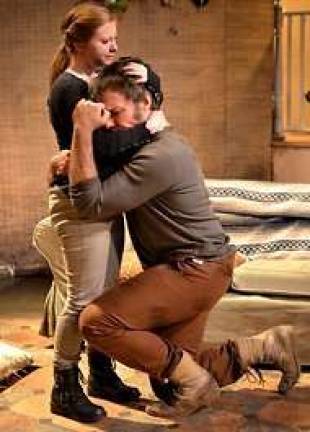Out of this World

Mac Rogers' Honeycomb trilogy continues with Blast Radius By Doug Strassler Blast Radius is the second installment in a trilogy devised by Mac Rogers that defies typical categorization. It's firmly steeped in the tenets of science fiction, but sidesteps the need for flashy special effects. There are familial and romantic relationships at play, but they rarely fall into the trappings of melodrama. So what is it, exactly? Space philosophy comes closest to describing this entertaining work from the indie theatre group Gideon Productions at Long Island City's Secret Theatre. And yet there's no point trying to box in a work that comes from an author so clearly thinking outside of the box. Introductory text in the program catches the audience up from where Advance Man, the first part of Rogers' "Honeycomb trilogy" (this title makes more sense for those who have seen the works, and I run the risk of revealing too much if I try to describe it here). Blast picks up nearly two decades afterward, and an alien race has taken over Earth. Millions have been murdered, and among the living, families have been segregated and forced to live under an oppressive governing body. A resistance movement has been formed in a home for pregnant women, whom these aliens leave alone. (Aside for one hilarious prop gag, the aliens remain largely unseen.) Ronnie (an occasionally shrill but convincing Becky Byers), whom we first met in Advance Man as the daughter of one of the astronauts who made first contact with these dangerous aliens, spearheads this group, which increasingly puts her at odds with brother Abbie (a layered David Rosenblatt). Abbie seems to be drawn to the dark side, questioning the same human instincts and traditions the more than Ronnie and her renegades try to protect. Director Jordana Williams focuses on the show's emotional core in order to keep the audience engaged. Fraying connections to one another and personal stakes provide the heart of this work, not extra-terrestrial attacks. (Blast also improves upon its predecessor by the absence of explanatory monologues like the one that cluttered the climax of Advance Man.) Rogers, too, is smart enough to know that Blast can't be all dialogue, either; cast member Joe Mathers nimbly choreographs some entertainingly violent fight scenes. (Zoe Morsette did the special effects here.) This entire ensemble, which includes stellar actors like Felicia J. Hudson, Mathers, Alisha Spielmann and Kristen Vaughn, treats Rogers' words like poetry. Jason Howard and Cotton Wright turn in particularly gripping, realistic performances. And yet I worry that Rogers' savvy and all of Williams' considerable directorial resources aren't enough for this trilogy. Yes, Blast gets a suitable production at the Secret, thanks in no part to Sandy Yaklin's set and Jeanne Travis's sound design. This story is ultimately a sci-fi miniseries, given an Off-Off berth, and it doesn't do full justice to this ambitious work. It deserves a bigger budget and richer production values. Through nobody's fault here, Blast still feels a bit like a pantomime act. And audiences truly deserving to get the full impact of this work. Which is why I can't wait for the conclusion.